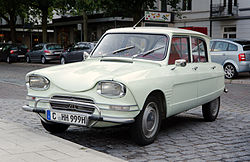Car platform
Cars on the same platform generally share look and wheelbase; the Toyota Camry shares a 2,776 mm (109.3 in) wheelbase with the Lexus ES[1]
A car platform (automobile platform) is shared common design and production over different models and types of automobiles. They may be sold under different names or "marques".[2]
It is done by the automotive industry to save the costs of development by basing the products on a smaller number of platforms. This allows companies to create distinct models from similar underpinnings.[2] It is also done with commercial vehicles like trucks and vans.
Car Platform Media
Nissan Pulsar (N16) 5-Door Hatchback
Nissan Primera P12 Station Wagon
Nissan Wingroad/Nissan AD Van Y1 Station Wagon
Nissan X-Trail (T30) Compact SUV
Nissan Almera Tino V10 Mini MPV
References
- ↑ Edmonston, Phil (2003). Lemon-Aid Used Cars and Minivans 2004. Penguin Group. p. 294. ISBN 978-0-670-04375-0. Retrieved 6 November 2010.
if you ignore the hype, know how to separate symbol from substance, and are smart enough to know that most the high-end models don't give you much more than their lower-priced entry-level versions. For example, the Lexus ES 300 is a Toyota Camry with a higher price
- ↑ 2.0 2.1 Brylawski, Michael (1999). "Uncommon knowledge: automobile platform sharing's potential impact on advanced technologies, pre-print for the 1st International Society for the Advancement of Material and Process Engineering (SAMPE) Automotive Conference". International Society for the Advancement of Material and Process Engineering. Archived from the original on 28 November 2010. Retrieved 6 November 2010.
{{cite journal}}: Cite journal requires|journal=(help)











